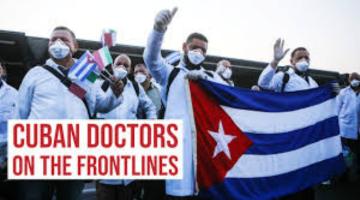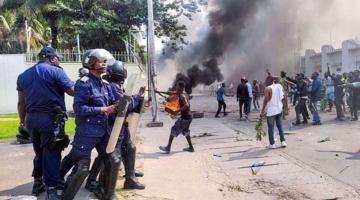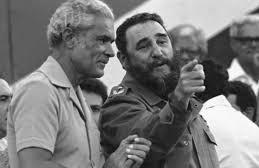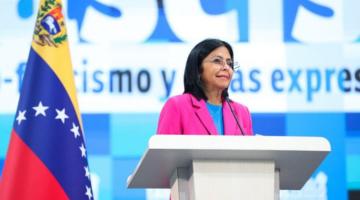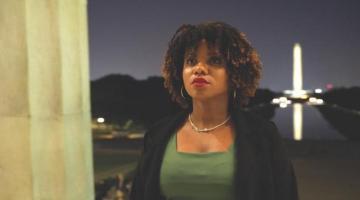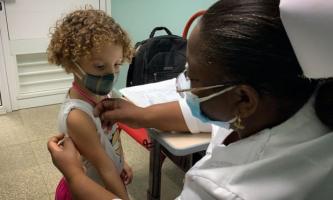“I recently joined the National Network on Cuba’s 15th “May Day International Brigade” of Voluntary Work and Solidarity with Cuba. The full brigade takes place from April 24 to May 8, 2022, in Havana, Artemisa, Villa Clara and Santiago de Cuba provinces, and includes one week of work and education alongside Cuban workers, and one week of historic and cultural immersion in Cuba. Unable to attend the full two week brigade, I was able to join the brigadistas on April 30th to experience May Day in Cuba, realizing a dream my late husband and I had for years.” - Jacqueline Luqman
It has been jarring coming back to the US where the confusion about who is the aggressor in the Ukraine conflict is so profoundly deep and expansive among so much of the population, but particularly among the alleged left. Jarring after spending a week in Revolutionary Cuba to witness the 2022 May Day Celebration in the country. The first since the pandemic and since the 2021 US- right-wing supported protests that spawned the failed #SOSCuba campaign, more than 6 million Cuban workers participated in May Day celebrations across the country, with the vast majority of them parading jubilantly, defiantly, and triumphantly through Revolutionary Square.
I saw with my own eyes the celebration of worker solidarity and the indefatigable defense of the Cuban Revolution as waves of workers walked with signs and costumes and Cuban flags past the iconic images of Ernesto “Che” Guevara on the Ministry of the Interior building with the words he may be most famous for accompanying his image, “Hasta La Victoria Siempre,” or “Always onwards onto victory,” and another of Camilo Cienfuegos on the adjacent Telecommunications Building with the words “Vas Bien, Fidel,” or “You are doing well, Fidel,” underneath the image. Any picture or video captured of the May Day 2022 parade would reflect an unabated stream of masses of people holding banners, waving flags or scarves, and dancing to a vibrant live band between the billboards on one building at the entrance to the Plaza that read “Cuba vive y trabaja (Cuba lives and works)” and the imposing 109-meter tall José Marti memorial that overlooks the plaza. For a little over two hours, Cuban workers celebrated their country, their revolution, and their socialism, and they were especially jubilant when the announcers acknowledged the union or the company or the banner they carried, and they blew kisses and shouted “gracias” and “Bloqueo no! Cuba sí!” at the members of the foreign delegations that were in the stands as spectators.
My arms were sore from waving at so many joyous Cubans waving back at me. My cheeks were a bit sore from smiling under that mask (and I should note that mask-wearing even among the millions who paraded on May Day, was nearly universal in Cuba). It was an extremely emotional experience seeing workers honored and celebrated so openly with such enthusiasm, seeing how the workers understood that their work does indeed defend their revolution and their country, with many in the crowds holding signs and banners in support of socialism - their socialism, their revolution. The day was also personally significant as this was the trip that was planned for next year with my late husband Abdushshahid, a truck driver who would have been just as emotional and full of joy had he been able to witness the level of respect and honor for the working class that doesn’t exist in the United States. Having made the trip a year early without him since his sudden passing in June of 2021, I know that he was with me in spirit, celebrating the contribution of workers right along with me.
Despite what US officials would have you believe, the people participating in the May Day celebrations in Cuba are not compelled to do so by the government. There is no force behind the overwhelming turnout of Cuban workers. Truth be told, it would be virtually impossible to compel at least 4 million people to participate in an orderly and unrestrained display of worker pride and joy as the one I witnessed on May 1, 2022, in Cuba. But because so many Americans have never been to Cuba to see the spectacle for themselves, they believe the lies told by the US government, the same government that holds the blockade in place that limits American travel to the country. The blockade, you see, is a tool the US must continue to impose for its propaganda against Cuba to continue to work because, once you see Cuba for yourself, you see the US and its lies for what they are - deadly imperialist propaganda and economic warfare.
The blockade was of course the primary topic of the International Meeting of Solidarity with Cuba, but it was not the only topic. There was well-deserved acknowledgment of the Cuban doctors who developed not one, not two, but FIVE vaccines for COVID-19. Cuba’s efforts to vaccinate its population not only resulted in the country of 11 million having a nearly 87% vaccination rate, with less than 10,000 deaths due to COVID; compared to the US vaccination rate of just over 65% and 1 million COVD deaths, but Cuba has also vaccinated a greater percentage of its population than most of the world’s richest countries and can be proud of yet again defying the murderous intentions of US imperialist policy against it. Cuba’s vaccines have allowed children as young as two years old to be vaccinated, allowed them to re-open schools safely, and provide several options for its citizens for protection against chronic disease that leads to death caused by the COVID-19 virus. Cuba did this under a criminal blockade that denied them the ability to import materials needed to vaccinate their people, such as syringes. But it was the global network of anti-imperialists in solidarity with Cuba that came to the aid of the people of Cuba, as we in the beating heart of imperialism understand that it is our primary responsibility to do what we can to assist those in the crosshairs of this government’s global reign of terror.
Dignitaries at the meeting included President Miguel Díaz-Canel, the first secretary of the Central Committee of the Cuban Communist Party, the president of the National Assembly (Parliament), Esteban Lazo, the Minister of Foreign Affairs, Bruno Rodríguez, and other political representatives who all in some way expressed the need for the delegates from 60 countries and 216 organizations to intensify the fight against imperialism.
Cuba’s Foreign Minister, Bruno Rodríguez Parrilla, made clear that Cuba is in solidarity with other countries that are the targets of US imperialism and the efforts to destroy people-focused left movements – countries like Bolivia, Nicaragua, Brazil, and Venezuela. Then the country’s president, Miguel Díaz-Canel Bermúdez, reiterated that solidarity with those countries and added emphatically that Cuba is also in solidarity with the demand by Caribbean nations through CARICOM for reparations for the global human trafficking crime against humanity, and lifted up Haiti in particular. Several speakers condemned the exclusion of Cuba, as well as Venezuela and Nicaragua, from the upcoming IX Summit of the Americas. Diaz-Canel condemned the US attempts to wage “unconventional warfare” on these countries through lies and double standards, and went on to state, "We want a Summit of the Americas and not a summit of the US and its selective states."
I felt that international left forces were given our marching orders from the political and ideological leaders of the country that continues to defend its revolution against US imperialism and aggression. The remarks from Cuban leaders and the panel discussions in the breakout sessions all conveyed the message to respect the diversity of culture and traditions in uniting in solidarity to defeat imperialism for all humanity. It seemed as though the call from the political leaders of Cuba was not just to focus on ending the blockade against Cuba, but to refocus our efforts on ending imperialism, because it is imperialism that ties all oppressed peoples around the world together, so only defeating imperialism will free us all, regardless of whatever cultural or traditional difference we may have. Not that some of us needed those marching orders, since many of us were even in Cuba because we are not just anti-war, we are ANTI-IMPERIALISTS, and we understand that it is imperialism that is the primary contradiction, the one connective tissue that causes all of our oppression and injustice the world over.
But I came back to a country where imperialism is a word and a concept that is grossly misunderstood, and the role of the US in conflicts the world over, and in Ukraine especially, is twisted into a macabre fairy tale narrative of “the US is good,” and whomever the US says is “bad” is vilified even by some on the so-called Left.
This well-oiled propaganda machine that has turned neo-Nazis in Ukraine into brave fighters and defenders, and that has reduced the former Soviet Red Army’s defeat of Nazi Germany into a crossed-out footnote in history that we are now told doesn’t mean what we think it means has clouded the minds of some on the US Left, but not in Cuba. Wherever I went in the country and was able to talk to regular Cubans or hear Cuban elected officials from small towns to larger cities speak, the violation of Ukraine’s sovereignty by the US-backed coup in 2014, the threat to Russia’s sovereignty by the expansion of NATO to former Warsaw Pact countries on Russia’s border, and the eight-year civil war against ethnic Russians in eastern Ukraine that the US and NATO have armed, were all issues that were raised as the causes of the war. Whenever the issue was discussed by anyone in Cuba, words like “US war,” “US imperialist war” and “US proxy war” were used frequently by the Cuban common person and elected officials alike.
And regular Cubans are also as clear on the effects of the blockade in the country and on the difficulties they face in their daily lives. Of course, Cubans are frustrated with food shortages and scarcity of materials and goods that would make their lives easier, such as farm equipment and personal hygiene items, such as office supplies or hair products, especially those specifically for Black hair. Seeing the patchwork of personal farms sown by oxen- or horse-driven plows on the steep side of hillsides throughout the rural countryside is a testament to the ingenuity that the Cuban people must rely upon to feed themselves. And in the process of expanding that ingenuity, the network of the members of the Asociación Nacional de Agricultores Pequeños (ANAP), or National Association of Small Farmers, provides critical assistance to peasant farmers to help them maximize their resources and outputs and has created a level of food sovereignty in Cuba that the blockade forced to come to fruition. Every plate of food I ate in Cuba brought to mind the multitude of roadside signs that could be seen everywhere we went in rural Cuba that declared the nearby farm an ANAP member, with the slogan “Campesinos produciendos por El Pueblo,” or “peasants producing for the town.”
And all of the anti-revolution propaganda from the US cannot diminish the pride that Cubans have in their Revolution, and their revolutionary heroes and heroines. You will not find many images of Fidel Castro adorning Cuban buildings or his name on street signs, because Castro famously refused to allow honoring him in that manner while he was alive. There is a Fidel Castro Museum and, of course, his monument and those of the revolutionaries in the July 26 rebellion in St. Ifigenia Cemetery. But Che Guevara is featured prominently throughout the country on posters, paintings on buildings, billboards, etc. But the country’s monuments to the revolution reflect the true depth of the victory over imperialist rule. The unassuming railcar museum of Che Gueverra’s guerilla victory at Santa Clara, the massive Che Guevara monument in the same town, the serene and moving final resting place of Fidel Castro and the martyrs of July 26, 1953 Revolution, occupy the same historic Saint Ifigenia cemetery where the stately mausoleum of the father of Cuba, José Martí is located. But there is also a monument to those Cubans who fought against imperialism abroad. The Pantheon of the Fallen for Internationalism is situated just behind and to the right of Fidel’s tomb and honors those Cubans who fought around the world, mainly in Angola. In fact, alongside the pride in the revolution that Cuba exudes, internationalism seemed to resonate in so many places that we visited in Cuba, with a particular emphasis on connections to Africa. The need to continue on the path of internationalism to fight and ultimately defeat imperialism resonated even from the monuments to Cuba’s revolutionary martyrs.
But no message about the need for international solidarity was clearer than the people we encountered who opened the heart of Cuba to us. Children in the Principe Enano neighborhood, one of the Committees for Defense of the Revolution, or CDR, were eager to show me and other brigadistas their arts and crafts, from African masks to elaborate dresses for shows Committees for the Defense of the Revolution is a network of neighborhood committees across Cuba developed after the failed Bay of Pigs invasion in 1961 that was initially established to defend against subversive activity in Cuba, but have since expanded to provide public health, education, food distribution, conservation, and community improvement. CDRs are an integral part of Cuban society and government, as recommendations from CDRs flow up the organizational ladder from block level, to district, then to the national level. Within each CDR, there are several schools for children of all ages, daycare centers for working parents, senior care centers, special needs schools, medical clinics, markets, food pantries, volunteer networks, housing development projects…all funded and supported by the Cuban government.
Parents of the Enano CDR spontaneously came out and shared fresh fruit and offered drinks to the delegation of brigadistas as we watched their middle school children put on a lovely performance for us. Residents of the neighborhood gathered for a Zumba class that was obviously a regular occurrence in the square because all the residents had the complex steps and frequent music changes down cold. An elderly woman who I am convinced carried with her the spirit of my late Grandmother came out of nowhere, sat next to me and patted my leg just like my Grandma used to as the residents and brigadistas danced together in the square. She took a picture with me, but covered up her smile just like my Grandma would sometimes do too, but her eyes couldn’t hide her joy.
In another CDR, Santa Maria, we were welcomed with an evening block party where the residents opened their homes to us. A small table laden with a pot of delicious mutton - something I warmly remember eating at my paternal relatives' house during summers as a child - and generous drinks and fresh fruit was offered to us. I was introduced to Janice and her neighbors, their children, and even their pets. They invited us to dance and talk, with Janice’s elderly father inviting us into their home to show me his decorations and accolades for fighting in the Cuban revolution, and particularly his service in Angola. He insisted on showing me a picture of his late wife, who he said and I could clearly see was of African descent. “Mi mujer, mi amor, era mulata,” he said. “My wife, my love, she was a mulatto.” I wasn’t sure what he was getting at, but then he said, “Cubanos y africanos unidos,” “Cubans and Africans are united.” Had he heard about the claims of rampant racism in Cuba? Was he trying to be the ambassador of Anti-Racist Cuba? He may have heard of those claims and I doubt that’s what he was trying to do. I took his enthusiasm as a man who was proud that he fought for his country’s freedom from imperialism, was proud that he fought for freedom from imperialism for another country, and very happy that he found love along the way. In a way he was a living testament to the internationalism that Fidel so strongly believed in, embodying in the pride he showed in displaying his war memorabilia the sentiment Fidel expressed that “...being internationalist means paying our own debt with humanity. Whoever cannot fight for others will never be sufficiently able to fight for themselves.”
This sentiment was obviously instilled in his daughter Janice, who was happy to talk to me about what it was like in her neighborhood and living in Cuba. I asked her what she would say to US citizens who believe that all the outpouring of support for the government among the Cuban people is forced. Janice said that the people in her neighborhood live together like a family, and the people of Cuba live together like a family most of the time. “What we want,” she said, “is to live with the whole world like a family, but first the world has to defeat imperialism.” She said the revolution in Cuba is strong, and cannot be defeated by US false propaganda or a 60-year blockade. She knitted her fingers together and emphasized, “The people of Cuba are strong. The Revolution is strong. We are united.”
If we on the left in the US want to end the blockade against Cuba, end the repression of left movements in the Global South, if we want to end the repression and exploitation of Africa, and bring about justice for nations looted in the global human trafficking crime against humanity, we must also not be defeated by the false imperialist propaganda about Cuba coming from the United States. We must be united and remain strong in our efforts to defeat IMPERIALISM, because that is the primary contradiction for all of us, and its demise is the only hope for humanity.
All the Revolutionary Cubans said so.
Jacqueline Luqman is co-host of By Any Means Necessary on Radio Sputnik. She is also a contributor to The Real News Network, Editor-In-Chief of the social media program Luqman Nation, and a contributor to Black Power Media. She has more than 20 years of activism in Washington, DC focusing on participating in and supporting community-level issues as well as regional and national issues that impact working-class, poor, and oppressed people in the US and abroad. She is a member of the Black Alliance for Peace, Pan-African Community Action, is a supporter of several other grassroots radical Black-focused and led organizations, and is an active member of the Board of Social Action in Plymouth Congregational United Church of Christ, a progressive church in Washington, DC.


